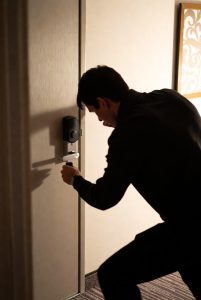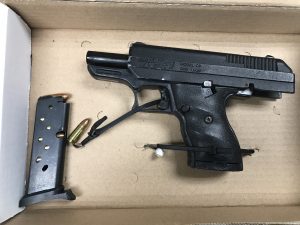Baltimore City police recently arrested an alleged serial burglar after executing a search warrant the resulted in the recovery of stolen property linked to more than a dozen different victims. The 34-year-old Prince George’s County man had numerous outstanding arrest warrants and now faces more than 50 different criminal counts in four separate open criminal cases. According to police reports the alleged thief used specialized tools to break and enter upscale hotels in Harbor East and Downtown Baltimore City. Law enforcement has thus far recovered more than $20,000 worth of stolen property including jewelry, electronics, passports, checks, clothing and credit cards. In addition to the hotels the defendant is also accused of burglarizing two apartments and a commercial building.
The hotel burglaries occurred in January and February of this year at Marriott and Hilton owned properties. Hotel staff did not report any type of forced entry and were not able to recover surveillance footage that specifically identified the defendant. Additionally, there were no unauthorized key card entries into the burglarized rooms, which further flummoxed hotel security. Detectives were ultimately able to identify the defendant using preserved surveillance footage from a 2024 burglary on President Street in Baltimore. He was arrested on March 3 and is now being held without bail at Baltimore Central Booking Intake Facility or BCBIC. In addition to the numerous burglary and theft charges, the defendant also faces charges of first degree assault, second degree assault, armed robbery, firearm use in a crime of violence, theft, malicious destruction of property and handgun possession from an alleged incident that occurred this past December. An arrest warrant was issued in this case on January 5, prior to string of recent burglaries.
The robbery charge is by far the most serious offense the alleged hotel burglar is up against due to the 5-year mandatory prison sentence that follows a conviction for use of a firearm in a crime of violence. However, the sheer number of burglary and theft charges may present significant challenges for the defendant. Maryland law classifies burglary in four different degrees, with first, second and third degree burglary all being felonies. First-degree burglary prohibits breaking and entering a home or dwelling with the intent to commit a theft or a crime of violence. The maximum penalty is 20 years for intent to commit theft and 25 years for intent to commit a crime of violence (home invasion). Hotel rooms count as dwellings under Maryland burglary law, so the defendant faces multiple first-degree burglary charges. Maryland law does not differentiate between and occupied or unoccupied dwelling, which means the offense is not less serious on paper if home or hotel room was empty. Second degree burglary deals with storehouses and other non-residential structures. Breaking and entering a store or other building with the intent to commit theft is a felony with a 15-year maximum penalty. Third degree burglary has a 10-year maximum penalty and is defined as breaking and entering a dwelling with the intent to commit any crime. Finally, fourth degree burglary is the catch all for breaking and entering any type of building (residential, government or commercial). Private yards or gardens can be included under the fourth degree burglary statute, which carries up to 3 years in prison upon conviction.
 Criminal Defense Lawyer Blog
Criminal Defense Lawyer Blog











